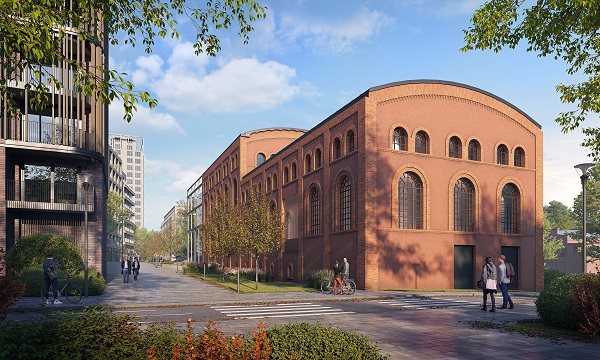 Illustration of the exterior of the future Sports Museum;
Credit: MSP
Illustration of the exterior of the future Sports Museum;
Credit: MSP
On Thursday 5 June 2025, Luxembourg's Minister of Sport, Georges Mischo, unveiled plans for a €30 million Sports Museum (Musée des Sports) to be built on the iconic "Rout Lëns" site in Esch-sur-Alzette, with opening scheduled for early 2029.
As reported by Luxembourg's Ministry of Sport, this historic site, with its former turbine halls and power plants, "provides ideal conditions for an innovative space dedicated to sports culture, collective memory and intergenerational exchange".
The project is part of a continuing effort underway for several years already. Initially planned to be installed in Lankelz in 2017, the project could not be realised due to the site's specific features, noted the ministry. After an evaluation in 2024, the former turbine hall and power plants on the Rout Lëns site was selected for its architectural potential and strong industrial symbolism, validated by a feasibility study.
The future Sports Museum will span three floors, with a total surface area of approximately 2,500 m², reportedly combining conservation, dissemination, interaction and reception.
This architectural framework will serve as the foundation for the project's three founding pillars:
- Conservation and transmission of sports heritage: the museum will highlight the history of Luxembourgish sport through a permanent and temporary exhibition, highlighting the great idols, the values of sport (fair play, team spirit, discipline), as well as its educational, social and health dimensions. The permanent exhibition will present the Luxembourg sporting world in all its diversity: the greatest athletes with their accessories and uniforms, the evolution of sport in Luxembourg, clubs, federations and other relevant themes. Temporary exhibitions will complement the offerings, for example, focusing on the link between sport and health or retracing the history of a sports federation on its anniversary. The museum will also play an active role in the preservation, enrichment and restoration of sports heritage, in conjunction with historical and scientific research. Particular emphasis will be placed on raising awareness among young people through interactive tools and educational workshops;
- Promoting sporting activity and debate: as a hub for discussion, the Sports Museum will regularly organise conferences, symposia and roundtables, in collaboration with federations and national and international experts. These events will address both current issues and the historical legacies of sport;
- A welcoming space for the sports community and beyond: the centre will also be made available to clubs, sports federations and private and public stakeholders to host conferences, meetings, general assemblies and festive events. This event-oriented dimension is expected to strengthen its local roots and make it more accessible to a wider audience.
Renovation work on the turbine halls will begin in June / July 2026 and is expected to be completed by March / April 2028. The museum is scheduled to open in early 2029. The estimated cost of the entire project is approximately €30 million.
The ministry emphasised: "Driven by a modern and unifying vision, the Sports Museum is in line with government commitments to sport, heritage and civic participation. It aims to become a benchmark site, both for the memory of sport and for its future."
Minister Mischo elaborated: "The future Sports Museum will be much more than an exhibition space: it will become a vibrant space for dialogue, memory and transmission, serving all generations. Sport is an integral part of our identity and deserves a space worthy of it."








